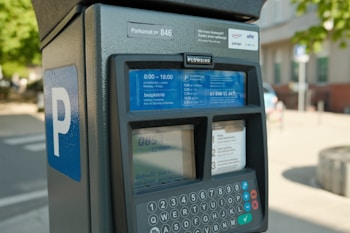 Transportation in Spanish
Transportation in Spanish
Collection of Spanish vocabulary related to transportation, including modes of transport, phrases, and expressions.
RENFE (Red Nacional de Ferrocarriles Españoles)
RENFE (Red Nacional de Ferrocarriles Españoles) is a Spanish word referring to the National Network of Spanish Railways. It's the state-owned company which operates freight and passenger trains on the 1,668 mm (5.5 ft) Iberian gauge, 1,435 mm (4 ft 8.5 in) standard gauge, and 1,000 mm (3 ft 3.4 in) meter gauge networks in Spain. Ultimately, RENFE symbolizes both the vast history and modern development of rail transport in Spain.
Example sentences with RENFE (Red Nacional de Ferrocarriles Españoles) →accidente aéreo
The Spanish term 'accidente aéreo' translates to 'air accident' in English. This phrase is used to describe incidents or mishaps that occur in the atmosphere involving any kind of aircraft. This can encompass a wide range of situations, from minor in-flight malfunctions to major catastrophes such as plane crashes. The severity of an 'accidente aéreo' can vary greatly, and they are subject to investigation by air traffic authorities to prevent similar incidents in the future.
Example sentences with accidente aéreo →accidente de coche
The phrase 'accidente de coche' in Spanish translates to 'car accident' in English. This term refers to a collision between two or more vehicles, or a collision between a vehicle and another object, such as a tree or a building. Car accidents often result in damage to the vehicles involved, and can also cause injury to people inside the vehicles. Like in English, 'accidente de coche' can be used to describe both minor and severe car accidents.
Example sentences with accidente de coche →accidente de tráfico
The Spanish phrase 'accidente de tráfico' translates to 'traffic accident' in English. This typically refers to a mishap that occurs on the road involving one or more vehicles. This could range from minor fender benders to major collisions, often resulting in damage to the vehicle and potential personal injury. Traffic accidents can be caused by numerous factors including but not limited to reckless driving, adverse weather conditions, mechanical failure, and impaired driving.
Example sentences with accidente de tráfico →accidente en cadena
The Spanish phrase 'accidente en cadena' translates to 'chain accident' in English. In a traffic context, a 'chain accident' indicates a series of road accidents caused by the effect of the first accident. Often, this happens when the first car abruptly stops, making following cars collide one after another. This term emphasizes the way every subsequent collision is causally linked to the first incident through a chain-like sequence.
Example sentences with accidente en cadena →accidente involuntario
The Spanish term 'accidente involuntario' directly translates to 'involuntary accident' in English. It is typically used to describe an incident that occurs without the intention or control of the involved parties. This term is often applied in contexts such as legal discussions, insurance policies, and general conversations where someone might talk about an accident they did not mean to cause or could not avoid.
Example sentences with accidente involuntario →accidente leve
The Spanish phrase 'accidente leve' translates to 'minor accident' in English. It refers to an incident or mishap that is less severe or serious, often implying little to no injury and minimal damage. It is typically used in contexts related to traffic accidents, workplace accidents, or other unfortunate events, where the consequences are not life-threatening or catastrophic. The term is relative and can vary based on the severity and perspective. Remember, 'accidente' means 'accident' and 'leve' translates to 'light' or 'minor' in English.
Example sentences with accidente leve →accidente mortal
The Spanish term 'accidente mortal' translates to 'fatal accident' in English. This phrase is used to describe an accident that resulted in one or more fatalities. An accident is an unplanned event that can cause harm or damage, and the word 'mortal' denotes that the harm caused is severe enough to cause loss of life. This phrase can be used in various contexts, but it is common to see it used in news reports and legal proceedings.
Example sentences with accidente mortal →accidente múltiple
The Spanish term 'accidente múltiple' translates directly to 'multiple accident' in English. This phrase is often used in the context of road safety or traffic reports and corresponds to incidents where more than one separate accident has occurred concurrently or in quick succession. This could be due to a chain reaction from an initial accident or because of severe road conditions causing multiple independent accidents. The term is a reminder of the potential dangers of road travel and the importance of safe driving practices.
Example sentences with accidente múltiple →
aceite
The Spanish word 'aceite' translates to 'oil' in English. In the context of cooking, 'aceite' is used to refer to a variety of oils used in food preparation, such as 'aceite de oliva' meaning 'olive oil'. 'Aceite' can also be used in a non-culinary context to refer to oils used in other areas like machinery and automobiles, similar to how 'oil' is used in English.

acelerador
The Spanish word 'acelerador' translates to 'throttle' in English. In the context of a vehicle, a throttle is a device controlling the flow of fuel or power to an engine. When you press the accelerator pedal with your foot, it opens the throttle, allowing more air into the engine. The engine control unit (ECU) then increases the amount of fuel injected into the engine, which increases power output. Hence, 'acelerador' is used in Spanish in the context of an engine's acceleration mechanism.
Example sentences with acelerador →
acelerar
The Spanish word 'acelerar' translates to 'accelerate' in English. This verb is commonly used in contexts pertaining to speed or pace. Similar to its English equivalent, it is used to denote the act of increasing speed, quickening an action or process, or bringing about something at an earlier than expected time.
Example sentences with acelerar →adelantamiento prohibido
The Spanish phrase 'adelantamiento prohibido' translates to 'prohibited advance' in English. This phrase is often used in traffic or road signs indicating that overtaking or passing is not allowed in that particular area. It is crucial to understand and obey such instructions for safe and rule-abiding driving on roads. Essentially, 'adelantamiento prohibido' is a command to stay in your current position or lane and not to move ahead of the vehicle in front.
Example sentences with adelantamiento prohibido →aeropuerto
In Spanish, 'aeropuerto' refers to an 'airport' in English. An air transport hub for planes to land and take-off.
Example sentences with aeropuerto →aeropuerto (nternacional
The Spanish word 'aeropuerto (nternacional' translates to 'international airport' in English. It is a location where aircraft such as airplanes and helicopters take off and land. An international airport is typically equipped with longer runways and facilities to accommodate the larger aircraft needed for international travel. This type of airport usually has customs and immigration facilities to manage international flights to and from other countries.
Example sentences with aeropuerto (nternacional →aeropuerto militar
The Spanish term 'aeropuerto militar' translates to 'military airport' in English. It refers to an airport that is specifically designated for the use by the military. It is where military aircrafts take off, land, and are often maintained. This type of airport is used for defending a nation or conducting other military purposes. The exact activities and purposes may vary depending on the country and their specific military needs.
Example sentences with aeropuerto militar →
anticipo
'Anticipo' is a Spanish word that translates to 'advance' in English. It is often used in the contexts of finance and planning, where it can refer to a payment made ahead of its due date, or an action taken earlier than planned. This word exhibits the kind of forward-thinking that is common in both Spanish and English cultures. Thus, 'anticipo' provides an interesting glimpse into the shared values and priorities across languages.
anunciar un vuelo
The Spanish phrase 'anunciar un vuelo' translates to 'announce a flight' in English. It is commonly used in the context of airport announcements to articulate and publicly declare or notify all passengers present about scheduling details pertaining to a specific flight. It can be divided into three separate words - 'anunciar' meaning 'announce', 'un' meaning 'a', and 'vuelo' meaning 'flight'.
Example sentences with anunciar un vuelo →apagarse el indicador del nivel de aceite

aparcamiento
The word 'aparcamiento' in Spanish translates to 'parking' in English. It is primarily used in reference to the action of bringing a vehicle to a halt in a designated area or space where it can be left temporarily. This word is typically used in Spain more so than in Latin America. In usage, it is commonly found in contexts referring to roadside or controlled parking facilities, as well as in general discussions about driving or traveling. When visiting Spanish-speaking countries, this term could be very useful, especially if you are driving and need to find a place to park your vehicle.
aparcar en doble fila
The Spanish phrase 'aparcar en doble fila' translates to 'park in double row' in English. It refers to the act of parking a vehicle directly beside another parked vehicle on the road, essentially creating a second row of parked vehicles. This is often considered illegal or inappropriate because it can obstruct traffic and cause inconvenience for the other road users.
Example sentences with aparcar en doble fila →aparcar en zona azul
The Spanish phrase 'aparcar en zona azul' translates to 'park in blue zone' in English. In many Spanish cities, especially in the downtown areas, parking spaces are categorized into different zones, each having different rules and payment rates. The blue zone, or 'zona azul', is a paid parking area where you are allowed to park your vehicle for a limited time period. These areas are usually highly sought after as they are typically located in central or high-traffic areas.
Example sentences with aparcar en zona azul →aparcar en zona de carga y descarga
The term 'aparcar en zona de carga y descarga' translates to 'park in the loading zone' in English. This Spanish phrase is commonly seen on road signs or in parking lots, indicating an area where vehicles are allowed to be temporarily parked for the purposes of loading or unloading goods. Therefore, it's important not to leave your vehicle there for longer than it's necessary, as it could obstruct the normal functioning of businesses or could result in a parking ticket.
Example sentences with aparcar en zona de carga y descarga →




